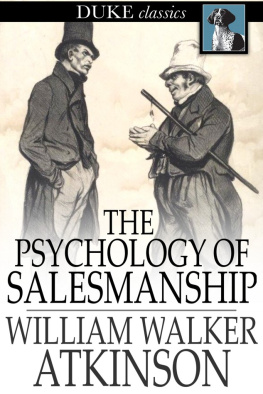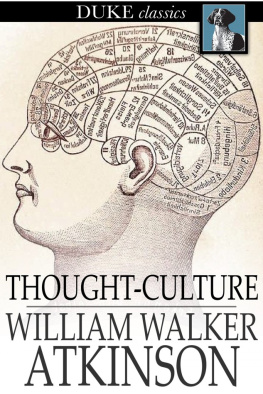William Walker Atkinson - The Psychology of Salesmanship
Here you can read online William Walker Atkinson - The Psychology of Salesmanship full text of the book (entire story) in english for free. Download pdf and epub, get meaning, cover and reviews about this ebook. year: 2013, publisher: Duke Classics, genre: Science. Description of the work, (preface) as well as reviews are available. Best literature library LitArk.com created for fans of good reading and offers a wide selection of genres:
Romance novel
Science fiction
Adventure
Detective
Science
History
Home and family
Prose
Art
Politics
Computer
Non-fiction
Religion
Business
Children
Humor
Choose a favorite category and find really read worthwhile books. Enjoy immersion in the world of imagination, feel the emotions of the characters or learn something new for yourself, make an fascinating discovery.
- Book:The Psychology of Salesmanship
- Author:
- Publisher:Duke Classics
- Genre:
- Year:2013
- Rating:3 / 5
- Favourites:Add to favourites
- Your mark:
- 60
- 1
- 2
- 3
- 4
- 5
The Psychology of Salesmanship: summary, description and annotation
We offer to read an annotation, description, summary or preface (depends on what the author of the book "The Psychology of Salesmanship" wrote himself). If you haven't found the necessary information about the book — write in the comments, we will try to find it.
The amazingly prolific thinker and writer William Walker Atkinson made his mark in a staggering variety of different fields, ranging from Hindu theology to the New Thought movement that eventually gave rise to abidingly popular concepts such as the Law of Attraction. In this timeless volume, he applies his insightful ideas to the field of salesmanship. Its a must-read for anyone whose livelihood relies on their skill of persuasion.
William Walker Atkinson: author's other books
Who wrote The Psychology of Salesmanship? Find out the surname, the name of the author of the book and a list of all author's works by series.
The Psychology of Salesmanship — read online for free the complete book (whole text) full work
Below is the text of the book, divided by pages. System saving the place of the last page read, allows you to conveniently read the book "The Psychology of Salesmanship" online for free, without having to search again every time where you left off. Put a bookmark, and you can go to the page where you finished reading at any time.
Font size:
Interval:
Bookmark:

First published in 1912
ISBN 978-1-62013-110-7
Duke Classics
2013 Duke Classics and its licensors. All rights reserved.
While every effort has been used to ensure the accuracy and reliability of the information contained in this edition, Duke Classics does not assume liability or responsibility for any errors or omissions in this book. Duke Classics does not accept responsibility for loss suffered as a result of reliance upon the accuracy or currency of information contained in this book.
Until the last few years the mere mention of the word "psychology" inconnection with business was apt to be greeted with a shrug of theshoulders, a significant raising of the eyebrowsand a change of thesubject. Psychology was a subject that savored of the class room, orelse was thought to be somehow concerned with the soul, or possiblyrelated to the abnormal phenomena generally classified as "psychic." Theaverage business man was apt to impatiently resent the introduction intobusiness of class room topics, or speculation regarding the soul, or oftheories and tales regarding clairvoyance, telepathy, or general"spookiness"for these were the things included in his concept of"psychology."
But a change has come to the man in business. He has heard much of lateyears regarding psychology in business affairs, and has read somethingon the subject. He understands now that psychology means "the science ofthe mind" and is not necessarily the same as metaphysics or "psychism."He has had brought home to him the fact that psychology plays a mostimportant part in business, and that it is quite worth his while toacquaint himself with its fundamental principles. In fact, if he hasthought sufficiently on the subject, he will have seen that the entireprocess of selling goods, personally, or by means of advertising ordisplay, is essentially a mental process depending upon the state ofmind induced in the purchaser, and that these states of mind are inducedsolely by reason of certain established principles of psychology.Whether the salesman, or advertiser, realizes this or not, he isemploying psychological principles in attracting the attention, arousingthe interest, creating the desire, and moving the will of the purchaserof his goods.
The best authorities on salesmanship and advertising now recognize thisfact and emphasize it in their writings. George French, in his "Artand Science of Advertising" says regarding psychology in advertising:"So we can dismiss the weird word, and simply acknowledge that we cansell things to a man more readily if we know the man. We can'tpersonally know every man to whom we wish to sell goods. We musttherefore consider if there are not certain ways of thinking and ofacting which are common to all men, or to a large proportion of men. Ifwe can discover the laws governing the action of men's minds we willknow how to appeal to those men. We know how to appeal to Smith, becausewe know Smith. We know what will please Brown, because we know Brown. Weknow how to get our way with Jones, because we know Jones. What theadvertiser must know is how to get at Smith, Brown, and Jones withoutknowing any of them. While every man has his personal peculiarities, andwhile every mind has its peculiar method of dealing with the facts oflife, every man and every mind is controlled, in a large sense and to agreat extent, by predilections and mind-workings which were establishedbefore he lived, and are operated in a manner separate from hispersonality. Our minds are more automatic, more mechanical, than we arewilling to admit. That which we loosely call mind is largely theautomatic expression of tendencies controlled by physical conditionswholly apart from conscious intellectual or moral motives or qualities.What those physical conditions are, and how the knowledge of what theyare may be utilized by advertisers, forms the body of that new knowledgesome like to call psychology, so far as it concerns advertising." Mr.French has well expressed the idea of the important part played inbusiness by psychology. What he says is, of course, as applicable topersonal salesmanship as to salesmanship through advertisementsthesame principles are present and operative in both cases.
In order to bring to the mind of the reader the full idea of theoperation of psychological principles in the sale of goods, we shallmention a few particular instances in which these principles have playeda part. Each reader will be able to recollect many similar instances,once his attention is called to the matter.
Prof. Halleck, a well known authority on psychology says: "Business mensay that the ability to gain the attention is often the secret ofsuccess in life. Enormous salaries are paid to persons who can writeadvertisements certain to catch the eye. A publisher said that he hadsold only five thousand copies of an excellent work, merely because ithad failed to catch the attention of many, and that twenty-five thousandcopies could have been disposed of in the same time, if agents hadforced them upon the notice of people. Druggists say that any kind ofpatent medicine can be sold, if it is so advertised as to strike theattention in a forcible manner. Business life has largely resolveditself into a battle to secure the attention of people."
The same excellent authority says, regarding the effect of associatedideas: "An eminent philosopher has said that man is completely at themercy of the association of his ideas. Every new object is seen in thelight of its associated ideas.... The principle of the association ofideas is sufficient to account for the change in fashions. A woman in asouthern city had a bonnet that she particularly admired, until she oneday saw three negresses wearing precisely the same pattern. She neverappeared again in that bonnet. When a style of dress becomes 'common,'and is worn by the lower classes, it is discarded by the fashionablepeople. Fashions that are absolutely repulsive will often be adopted ifthey are introduced by popular or noted people.... A knowledge of thepower of the association of ideas is of the utmost importance inbusiness. One man has his store so planned that all its associations arepleasing, from the manner of the clerks to the fixtures and drapery.Another store brings up unpleasant associations.... When negligeehats first made their appearance, a shrewd hatter sent for awell-dressed and popular collegian and offered him his choice of thebest hats in the store, if he would wear a negligee hat for three days.He objected to making such an exhibition of himself, until he wasflattered by the hatter's wager that the hats could, in this way, bemade the fashion for the entire town. When the collegian first put inhis appearance on the campus with the hat, he was guyed for his oddity.Late in the afternoon, some of his friends concluded that the hatlooked so well that they would invest. On the following day largenumbers reached the same conclusion. For some time after this the hatterfound difficulty in keeping a sufficient supply in stock. Had anunpopular or poorly dressed man appeared first on the campus with thathat, the result would have been the reverse. The hat would have been thesame, but the association of ideas would have differed. Some of theladies of fashion in a large European city selected on their ownresponsibility, without consulting the milliners, a cheap spring Manillahat, which was very handsome. The milliners found themselves with ahigh-priced stock for which there was no demand. They held a council,bought a large number of the cheap hats, and put them on the heads ofall the female street sweepers and scavengers in the town. When theladies of fashion went out the next day, they were amazed to see thevery dregs of the city arrayed in headgear like their own. It was notvery long before the result was what might have been expected."
Font size:
Interval:
Bookmark:
Similar books «The Psychology of Salesmanship»
Look at similar books to The Psychology of Salesmanship. We have selected literature similar in name and meaning in the hope of providing readers with more options to find new, interesting, not yet read works.
Discussion, reviews of the book The Psychology of Salesmanship and just readers' own opinions. Leave your comments, write what you think about the work, its meaning or the main characters. Specify what exactly you liked and what you didn't like, and why you think so.













